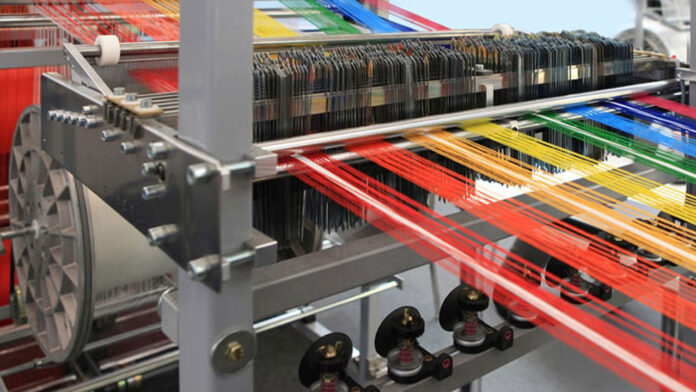Pakistan’s textile exports, a major source of foreign exchange earnings, fell by 8% month-on-month and 7% year-on-year to $1.3 billion in November 2023, according to a report by Topline Pakistan Research.
The decline is mainly attributed to the recent surge in gas prices, which increased the cost of production and reduced the competitiveness of Pakistani textile products in the international markets, the research firm said.
The textile sector is divided into two segments: basic textiles and value-added textiles. Basic textiles include raw cotton, cotton yarn, cotton cloth, and other fabrics, while value-added textiles include towels, knitwear, bedwear, readymade garments, and other products.
Basic textile exports witnessed a mixed performance in November 2023, with a 14% month-on-month fall but a 20% year-on-year rise to $243 million. The year-on-year increase was mainly driven by a 12-fold surge in raw cotton exports, which reached $58 million in November 2023, compared to $5 million in November 2022. This reflects the significant improvement in the cotton crop this year, which was severely affected by floods last year.
Value-added textile exports, on the other hand, registered a decline in both month-on-month and year-on-year terms, reaching $920 million in November 2023, down by 6% and 12%, respectively. Towels were the worst-hit segment, with a 21% month-on-month and a 20% year-on-year fall in exports, followed by knitwear, bedwear, and readymade garments. The only exception was art silk and synthetic textiles, which saw a 9% month-on-month and a 10% year-on-year increase in exports.
Exports declined 6% in 5MFY24
In the first five months of the fiscal year 2023-24 (July-November), textile exports amounted to $6.9 billion, down by 6% year-on-year, as compared to $7.4 billion in the same period last year. This was mainly due to the global economic slowdown and the reduced demand for textile products.
The depreciation of the Pakistani rupee against the US dollar, however, boosted the value of textile exports in local currency terms, which rose by 19% year-on-year to Rs 376 billion in November 2023. The rupee has lost more than 10% of its value against the dollar since the start of the fiscal year in July 2023, due to the widening current account deficit and the rising inflation.
The government has set an ambitious textile export target of $25 billion for the fiscal year 2023-24, as part of its efforts to boost export-led growth and reduce the trade deficit.
However, the research firm predicted that textile exports are likely to reach $17 billion by the end of the fiscal year, up by 3% year-on-year, but far short of the target due to higher energy prices and pressure on local currency.
Gas tariff hike put on hold
Meanwhile, the Sindh High Court (SHC) has put on hold a notification from the Sui Southern Gas Company (SSGC) that announced a rise in gas tariffs last month and sent notices to the federal government and other relevant parties on a plea against the higher gas price for the textile sector.
The counsel for the petitioner told an SHC bench that the SSGC increased the rate for the natural gas provided to the textile sector on November 8, 2023. The interim government has no authority to impose such hikes in gas price, according to the counsel.
The court stayed the notification from the SSGC about the higher gas prices, stating that the stay would only affect the petitioners. The bench ordered the textile sector to hand over the extra bills to the naazir (court officer). The order applies to those industries that pay the increased amount to the naazir within seven days.
APTMA urges lower power tariffs
The All Pakistan Textile Mills Association (APTMA) has expressed deep concern over the poor performance of the power sector and urged the government to reduce power tariffs to 9-10 cents/kWh, which is the regional average and the level at which Pakistan’s exports can compete in global markets.
The association asked the caretaker Federal Minister for Energy Muhammad Ali to speed up the reform process in view of the serious situation.
APTMA said that power consumption in December 2023 has dropped by 26% for industrial consumers and by 8% for domestic consumers on the LESCO network, mainly due to the decline in high-end domestic consumption.
This sharp drop in power demand is the result of unreasonable decisions in the Power Division that have pushed power tariffs to levels that are unaffordable for both industrial and residential consumers.
APTMA said that export-oriented sectors cannot operate at current power tariffs that are almost double the average of regional competitors like India, Bangladesh, and Vietnam. They warned that the fall in power consumption by industrial and high-end domestic consumers will cause huge losses to the already financially unstable and indebted power sector and will require a high Quarterly Tariff Adjustment (QTA) for Q2FY23.
APTMA estimated that the QTA for Q2FY23 will be around Rs6/kWh, taking the total power tariff for industrial consumers to about Rs54.5/kWh (19.5 cents/kWh), excluding the various duties and taxes. They said that such a high power tariff will further worsen the economic situation, leading to a drastic reduction in industrial activity and loss of millions of jobs.
APTMA said that irrational power tariff policies have created a vicious cycle of high power tariffs reducing consumption, which leads to further hikes in power tariffs that reduce consumption even more.




